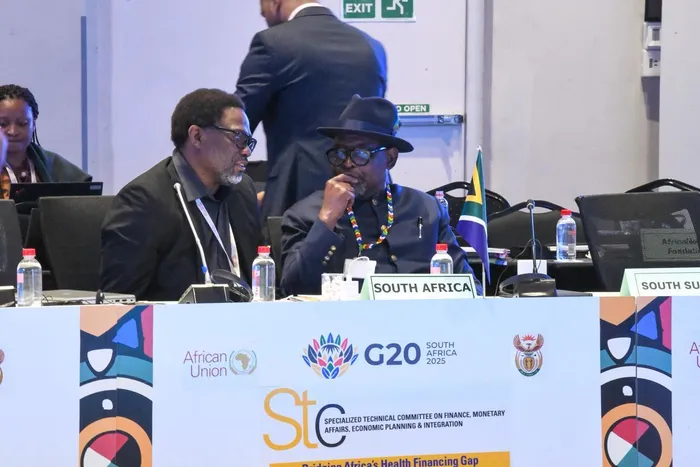Africa's health financing crisis demands urgent action, says Godongwana
AFRICAN UNION

Finance Minister Enoch Godongwana said at the African Union’s 8th Specialized Technical Committee on Finance, Monetary Affairs, Economic Planning and Integration in Johannesburg on Thursday.
Image: Supplied
Africa must urgently strengthen its health financing systems and reduce reliance on increasingly unreliable external aid, Finance Minister Enoch Godongwana said on Thursday.
Speaking at the African Union’s 8th Specialized Technical Committee on Finance, Monetary Affairs, Economic Planning and Integration, Godongwana warned that the continent’s health sector faces multiple crises, including underfunding, overstretched systems, and rising debt-service obligations.
"This challenge adds on the existing increase in our debt-service obligations and diminished fiscal space to make available for domestic health spending," he said.
"These challenges demand that we take charge in strengthening the resilience of our health financing whilst strategically weaning ourselves off external financing that is becoming less reliable."
Godongwana highlighted South Africa’s 2025 G20 Presidency as an opportunity to place Africa’s concerns at the centre of global economic reform.
He reiterated South Africa's G20 Presidency of “Solidarity, Equality, and Sustainability,” calling for collective global action on health financing, reforms to an unequal financial system, and domestic resource mobilization across the continent.
"Through “Solidarity,” we recognize that global health challenges require collective solutions. South Africa is supporting a new global compact on health financing, a model that is proactive and not crisis driven and is solidarity based," Godongwana said.
"Through "Equality," it is a reality that the continent’s health financing gap is an issue of global inequality. We are pushing for reforms to the global financial architecture to make it more equitable and representative. A key priority of our G20 Presidency is addressing the unsustainable debt burdens that destroy developing economies and prevent developing economies from investing in critical public services, including healthcare.
"Through "Sustainability," we must ensure that health financing is sustainable, not just for a single financial year but for generations to come. This means strengthening our own domestic resource mobilization and finding innovative ways of financing our health sectors."
Godongwana also urged African governments to expand budget allocations to health, in line with the Abuja Declaration, while also adopting innovative fiscal policies such as health taxes on tobacco and alcohol.
"There is a need to explore innovative fiscal policies to increase revenue, through targeted taxes on products harmful to health, such as tobacco and alcohol and improve the efficiency and transparency of our public financial management to make sure that every resource allocated for health is used effectively," Godongwana said.
He further stressed the role of public-private partnerships and global measures to stem illicit financial flows, which drain billions from African economies.
"This will unlock billions of dollars in revenue that are currently lost to our economies, and funds that could be reinvested in our health systems in strengthening primary healthcare, and in building a resilient health workforce," he said.
Africa’s demographic dividend, mineral wealth, renewable energy potential, and agricultural land position the continent as “a central pillar of tomorrow’s healthier world,” Godongwana added, calling for a new development paradigm focused on investment rather than aid.
“African countries must approach development with sharper investment discipline,” Godongwana said. “The era of aid is largely over.”
Nardos Bekele-Thomas, the CEO for the Africa Union Development Agency- New Partnerships for Africa's Development (AUDA- NEPAD), also urged African ministers to take bold steps toward financial sovereignty and development.
Bekele-Thomas said Africa’s health economy could grow to $259 billion by 2030, making the sector a potential engine of growth.
She urged ministers to defend the preferred creditor status of African financial institutions; operationalize the AU Development Fund; reform monetary systems to finance growth, not just control inflation; mobilize domestic capital for health, agriculture, energy, and industry; and end illicit financial flows that “rob Africa of its future.”
“Africa is not here for bailouts or sympathy. We are here to lead, to design, and to deliver. The hospitals we finance, the corridors we build, the industries we scale, and the energy we generate will determine whether Agenda 2063 becomes a reality or remains just a slogan,” she said.
The meeting will continue over two days, with ministers and delegates expected to develop a coordinated continental response to Africa’s health financing challenges.
BUSINESS REPORT